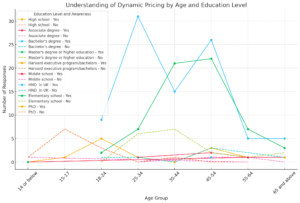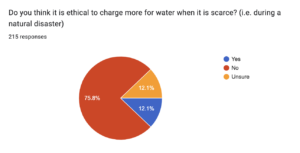Week 11: Interview w/Andres and Survey Results
June 7, 2024
Ethical missteps in dynamic pricing are typically short-lived due to market correction
Welcome back to my blog!
What I mentioned above is only one of the interesting things that Andres mentioned in our interview in week 9, here is a summary of everything else we talked about:
Andres Fabris is the founder and CEO of a company that provides a dashboard for corporations to track employee purchases in real-time. For example, with airlines, the system integrates various travel-related services, offering a comprehensive solution for managing travel data. The system operates post-booking, detecting bookings from any travel sites and from confirmation emails and providing a comprehensive overview for the corporation. Andres’s role within the company includes setting the company’s direction, hiring, raising capital, public relations, and interacting with clients and investors.
When asked about challenges that his company has gone through he talks about convincing large, risk-averse clients to adopt new technology and navigating through economic downturns like COVID-19. He emphasises how important the usage of a subscription-based revenue model for resilience during low transaction periods such as COVID-19 because fewer people were buying things like concert tickets and airline tickets otherwise they probably would not have had enough revenue.
Andres defined dynamic pricing as “a system where prices are adjusted in real-time based on market signals” and adds that though it was initially used by airlines, it now extends to hotels, activities, and even restaurants, where inventory is perishable.
He goes on to explain how dynamic pricing offers multiple price points and personalised offers to improve revenue and that price changes are usually due to inventory shifts or personalized discounts, not discriminatory practices.
He also talks about the transition from older systems to new distribution capabilities (NDC) that allows for more dynamic and personalised pricing. Andres then predicts that dynamic pricing will become more prevalent, urging companies to adopt it to stay competitive.
On another note, this week I have also managed to finish my analysis of my survey and wanted to share some interesting things that I found from it.
Below is a chart that represents the understanding of dynamic pricing by age and education level. Though I originally predicted that the older you are and the higher education level you have the more likely you are to know what dynamic pricing is, it was exciting to see that information confirmed through the survey.

One of the theoretical questions that I asked was as follows (attached is also a pie chart of how many yes/no I received):

The following are quotes that reasonably represent each age group’s reasoning behind their answer:
14 or Below:
- “I don’t know”
15-17:
- “Water is a necessity, and upcharging doesn’t benefit anyone except the seller.”
18-24:
- “People deserve to get water. It shouldn’t be like a luxury.”
25-34:
- “Water is a necessity, not a luxury, so it should be free and readily available to everyone.”
35-44:
- “Water is an essential need.”
45-54:
- “Water should be made available to more people.”
55-64:
- “When people are struggling, companies should not take advantage of shortages.”
65 and Above:
- “Only if water is very scarce. Otherwise, it’s price gouging.”
Additionally, this week I spent a lot of time continuing to work on my final deliverable and am confident that I will have it completed by Monday, when I will do one last look over it with my BASIS advisor, Mr. Lee, to make sure that everything is good to be handed in. I also started creating my slides for my presentation, which I will also make sure is completed by Monday in order to ask Mr. Lee to also review those.
Keep tuned for my final blog post next week because I will share my concluding thoughts and links to my presentation and final deliverable for anyone who is interested in getting to see those!

Leave a Reply
You must be logged in to post a comment.